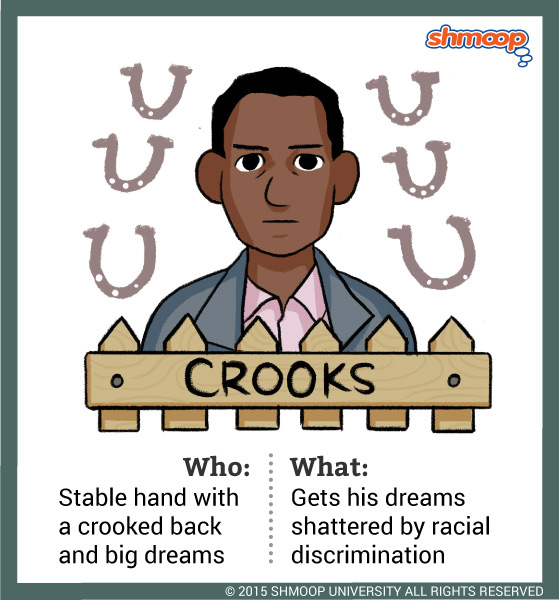Character Analysis

(Click the character infographic to download.)
Crooks (named for his crooked back) is the stable hand who works with the ranch horses. He lives by himself because he is the only black man on the ranch. Crooks is bookish and likes to keep his room neat, but he has been so beaten down by loneliness and prejudicial treatment of that he is now suspicious of any kindness he receives.
Lennie's brief interaction with Crooks reveals the complexity of racial prejudice in the northern California ranch life. Though Crooks was born in California (not like many Southern blacks who had migrated, he implies), he is still always made to feel like an outsider, even in his home state. Crooks is painfully aware that his skin color is all that keeps him separate in this culture. This outsider status causes him to lament his loneliness, but he also delights in seeing the loneliness of others, perhaps because misery loves company. When Crooks begins to pick on Lennie, suggesting George won't come home, we discover the slight mean streak that undoubtedly develops after being alone for so long. Lennie unwittingly soothes Crooks into feeling at ease, and Candy even gets the man excited about the dream farm, to the point where Crooks could fancy himself worthy and equal enough to be in on the plan with the guys.
Crooks's little dream of the farm is shattered by Curley's wife's nasty comments, slotting the black man right back into his "place" as inferior to a white woman. Jolted into that era's reality by Curley's wife harsh treatment, Crooks refuses to say the woman is wrong. Instead, he accepts the fact that he lives with ever-present racial discrimination. He dismisses the other men, saying he had "forgotten himself" because they'd treated him so well. It seems Crooks defines his own notion of himself not based on what he believes he's worth, but on knowing that no matter how he feels, others around him will always value him as less. As quickly as he got excited about the dream, he abandons it, telling Candy he was "Jus foolin" about being interested in his own freedom and happiness.
Crooks' Timeline